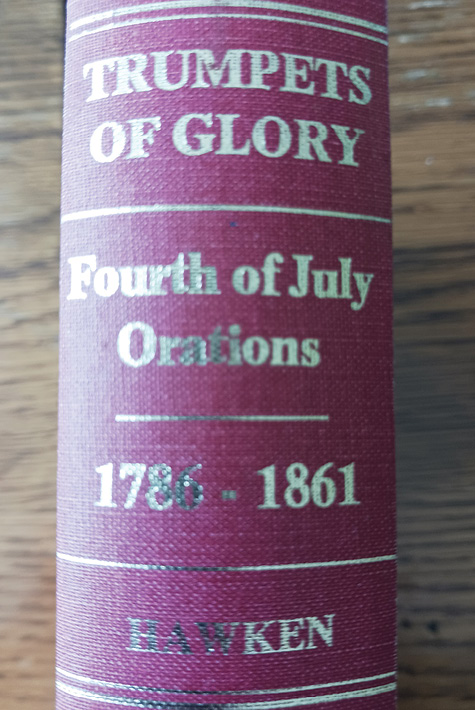Next year marks the 250th anniversary of the signing of the Declaration of Independence and the birth of our nation. At the Salmon Brook Historical Society, a notable book in our library from our 200th anniversary in 1976 continues to offer insight into the early history of our republic. Trumpets of Glory, written by Henry Hawken, focuses on July 4th speeches and orations delivered between 1786 and 1861.

Hawken was a member of the Salmon Brook Historical Society, and he received a grant from the State of Connecticut Historical Commission to write the book. He spent seven years researching, writing and editing this scholarly work. The book features speeches from prominent figures such as John Quincy Adams, Noah Webster, Davy Crockett, William Henry Seward and Henry David Thoreau. It also includes addresses by four ministers who opposed slavery, as well as by Richard Rush, the youngest United States Attorney General, and son of Benjamin, a signer of the Declaration of Independence.
Although Hawken lived in Granby for many years, he was raised in New Haven and attended Hopkins School, where he was encouraged to debate and refine his speaking skills. He earned his undergraduate degree at Purdue University and later received his master’s and doctoral degrees in American Studies and Speech Communication at Indiana University. While at Indiana University, he was also on their debate team. His doctoral dissertation focused on Henry Smith Lane [1811–1881], governor of Indiana. Hawken’s passion for oratory found expression in Trumpets of Glory, which remains part of the Salmon Brook Historical Society collection.
As Hawken describes in his book, July 4th speeches were common in the early years of our nation. Following the Civil War, Decoration Day was created in 1868, and it evolved into Memorial Day and over time overshadowed July 4th speeches and parades.
As noted by former curator Carol Laun in her Drummer article in June 2020, Granby’s last July 4th speeches and parades occurred in the 1940s as the country shifted its focus from July 4th celebrations to Memorial Day Commemorations.
Although the reason Hawken selected the 15 speeches for his book is not known, Trumpets of Glory is a well-researched reference book for anyone interested in early American oratory. These addresses were lengthy by today’s standards, often lasting an hour or more. For instance, Richard Rush had to shorten his speech in half, delivering in one hour instead of two. At the Gettysburg dedication on Nov. 19, 1863, Edward Everett’s speech ran two hours, while Abraham Lincoln’s famous speech lasted two and a half minutes. In the nineteenth century, with no radio, television or computers, sermons and political speeches served as an important form of public entertainment and engagement.
For those interested in purchasing Trumpets of Glory or learning about Henry Hawken, or July 4th parades, join the Salmon Brook Historical Society by calling 860-653-9713 or go online at salmonbrookhistoricalsociety.com